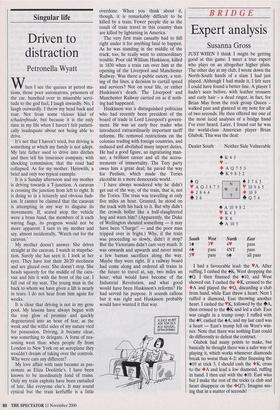Singular life
Driven to distraction
Petronella Wyatt
When I see the queues at petrol sta- tions, those poor automatons, prisoners of the car, hunched over in miserable servi- tude to the god fuel, I laugh inwardly. No, I laugh outwardly. I throw my head back and roar. Not from some vicious kind of schadenfreude, but because it is the only time in my life when I haven't felt patheti- cally inadequate about not being able to drive.
It's not that I haven't tried, but driving is something at which my family is not adept. My late father used to drive into ditches and then tell his insurance company, with shocking commission, that the road had collapsed. As for my mother. Herewith, a brief and only too typical example.
It is a Sunday afternoon and my mother is driving towards a T-junction. A caravan is crossing the junction from left to right. It is doing so in a leisurely and obvious fash- ion. It cannot be claimed that the caravan is attempting in any way to disguise its movements. If, seated atop the vehicle were a brass band, the members of it each waving flags, its progress would not be more apparent. I turn to my mother and say, almost incidentally, 'Watch out for the caravan.'
My mother doesn't answer. She drives straight at the caravan. I watch in stupefac- tion. Surely she has seen it. I look at her eyes. They have lost their 20/20 steeliness and are glazed over. She doesn't stop. She heads squarely for the middle of the cara- van and hits it with the front of the car. I fall out of my seat. The young man in the back to whom we have given a lift is nearly in tears. I do not hear from him again for weeks.
It is clear that driving is not in my gene pool. My lessons have always begun with the rosy glow of promise and quickly degenerated into an hour of fear, as the weak and the wilful sides of my nature vied for possession. Driving, it became clear, was something to delegate. A form of rea- soning went thus: when people fly from London to New York on an aeroplane they wouldn't dream of taking over the controls. Why were cars any different?
My love affair with taxis became as pas- sionate as Eliza Doolittle's. I have been known to be inordinately fond of trains. Only my train exploits have been curtailed of late, like everyone else's. It may sound cynical but the train kerfuffle is a little overdone. When you think about it, though, it is remarkably difficult to be killed by a train. Fewer people die as the result of train travel in this country than are killed by lightening in America.
The very first train casualty had to fall right under it for anything fatal to happen. As he was standing in the middle of the track, too, he really went to extraordinary trouble. Poor old William Huskisson, killed in 1830 when a train ran over him at the opening of the Liverpool and Manchester Railway. Was there a public outcry, a test- ing of the lines, a decision to curtail speed and services? Not on your life, or rather Huskisson's death. The Liverpool and Manchester Railway carried on as if noth- ing had happened.
Huskisson was a distinguished politician who had recently been president of the board of trade in Lord Liverpool's govern- ment. He was an early free trader who introduced extraordinarily important tariff reforms. He removed restrictions on the colonies trading with foreign countries, and reduced and abolished many import duties. He had a good figure, an ingratiating man- ner, a brilliant career and all the accou- trements of immortality. The Tory party owes him a great deal; he paved the way for Peelism, which made the Tories electable in a more democratic world.
I have always wondered why he didn't get out of the way, of the train, that is, not the Tories. The train was travelling at only five miles an hour. Granted, he stood on the track with his back to it. But why didn't the crowds holler like a half-slaughtered hog and warn him? (Apparently, the Duke of Wellington shouted something — it may have been 'Charge!' — and the poor man tripped over in fright.) Why, if the train was proceeding so slowly, didn't it stop? But the Victorians didn't care very much. It was onwards and upwards and never mind a few human sacrifices along the way. Maybe they were right. If a railway board had come along and ordered all trains in the future to travel at, say, two miles an hour, what would have become of the Industrial Revolution, and what good would have been Huskisson's reforms? He had served his purpose. It sounds callous but it was right and Huskisson probably would have wanted it that way.


























































































 Previous page
Previous page